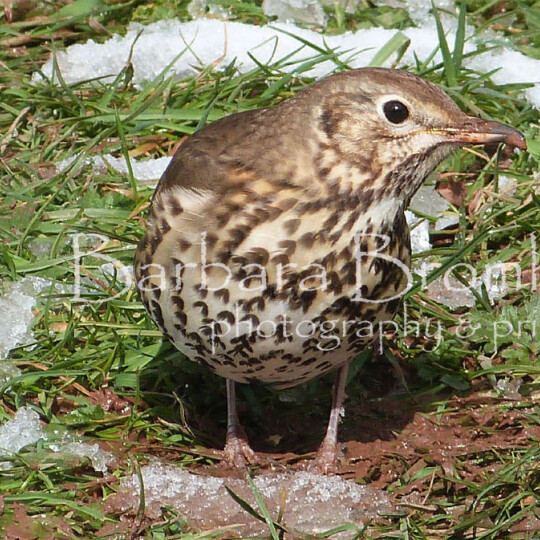Vanishing sounds - I have childhood memories of hearing a Song Thrush smack snail against stone in my grandparents’ garden – one of the many elements to the surround sound of the countryside.
Many children today won’t have the chance to build similar memories because this once common, speckled cousin to the Blackbird is in decline.. Of all the birds recorded since 1979, these British songbirds have faced the biggest losses..
Loss of habitat and food sources have hit hard on the numbers of these now elusive birds. Research shows that only 20% of young song thrushes live through their first winter.. Although there have been recent increases, they remain red-listed.
What can we do?
- Take part in the Big Garden Bird watch 29th - 31st January
Help draw a picture of wildlife numbers across the country - Food - tempting treats for Song thrushes
Apple, berries and mealworms are natural sources of food. The youngster in this week’s film appeared very fond of suet! - Ditch your slug pellets..
- Got the space to build habitat?
Tall dense hedges and good ground cover for nesting. Soil that isn’t sterile and over-drained.
Song thrush facts
- Welsh words for the Song thrush are 'bronfraith' (speckled breast) or ‘y fronfraith’ (the thrush).
- The Song Thrush symbolises faithfulness and healthy relationships
- Male and female Song thrush look the same
- Their average age is 3 years - the oldest tracked thrush recorded by BTO was 11.
- The song from the thrush is a series of phrases with many repeated two or three times in succession.
The full range of a male thrush can contain 100 or more distinct phrases, including mimicry of other birds and sounds - we've heard impersonations of frogs and horses as well as other birds..!
Decline of a species
Between 1970 & 1995, the Song thrush population dropped by 54%. Their decline on farmland was an even more dramatic 70%.
Modern intensive farming methods have played a part in this:
- Removal of hedgerows and ploughing headlands to increase yield.
- Over- drainage and compaction of the soil can lead to soil erosion, loss of nutrients and risks pollution of our waterways.
- Reliance on engineered pesticides damages our pollinators and has ill effects on the composition of our soils
Tried and true practices for a modern world?
Our ancestors learned what worked. Whilst we know more now, we shouldn't dismiss sustainable solutions because they are old-fashioned
- Contour ploughing allows the soil to retain water and nutrients – reducing the need for fertilisers.
- Re-wildling of headlands, water meadows and other habitat re-establishes connections to the natural world.
- Hedgerows are more than barriers for stock animals.
Along with verges, these living habitats are all important to the balanced eco-system that grows our best food.
- YouTube
